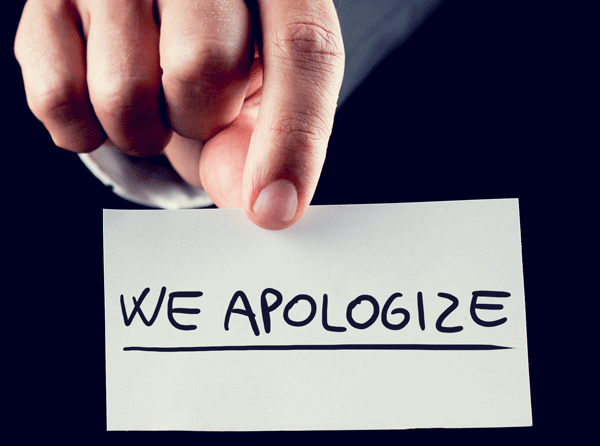By DHRUTI M KAPADIA-ADVOCATE, SOLICITOR, ADVOCATE-ON-RECORD, SUPREME COURT OF INDIA & MEDIATOR
kapadiadhruti@gmail.com| April 24, 2021
“A WORD OF APOLOGY CAN HELP RESOLVE DISPUTES –IT IS WORTH THE TRY THAN HOLDING UPON EGOS TO CONTINUE THE DISPUTES-LEARN TO APOLOGISE IF YOU REALLY DESIRE TO RESOLVE THE DISPUTE”
Introduction:
When the mind tricks up and makes one realize that they have done a mistake than one must have the guts to admit it to the person wronged which can psychologically help relieve the pressing guilt that built over time.
The prime step in mending a relationship which is broken is by attempting to move towards a sorry-apology as it will help move forward in re-building the trust broken and will be step climbing up to sooth the communication relationship between each other.
The ease one gets by hearing another person say sorry is pretty comforting in the mind and it leads to step forward for opening dialogues , clearing out bitterness towards each other and also will help playing on stuffed emotions between the each other.
Why people Apologize?
Apology is also a healing tool and brings in good gestures between the parties. It says that you share values regarding appropriate behavior towards each other, that you have regrets when you don’t behave according to those values (intentionally or unintentionally), and that you will make greater efforts to live up to your shared standards of behavior. Timing can be crucial. An apology delayed may be an opportunity lost.
Generally it is human nature that when they are hurt or humiliated they often hope for an apology. They may hope that an apology from the person who caused them harm will restore dignity, trust, and a sense of justice. Whether you are requesting an apology or considering giving one, it is important to realize that a thoughtful apology can mend a relationship while a thoughtless one may cause further conflict.
Finally, the good apology is a gift to the relationship. Two people can feel secure in the knowledge that if they behave badly, even fight terribly, they can repair the disconnection. We strengthen our relationships when others know that we’re capable of reflecting on our behavior, that we’ll listen to their feelings, and that we’ll do our best to set things right.
Example of how to put forth Apology:
You could say: “I’m sorry that I used derogatory language at you yesterday at dinner party. I feel embarrassed and ashamed by the way I acted.”
To resolve the issue by apology, your words need to be sincere and authentic. Be genuine and honest with yourself, and with the other person, about why you want to apologize and then only you can expect the other person to let go or forgive.
In mediation the most compelling apology would consist of 6 main elements:
Expression of regret
Explanation of what went wrong
Acknowledgment of responsibility
Declaration of repentance
Offer of repair
Request for forgiveness
Why People don’t apologize?
Main reason why people don’t apologize is because they are afraid the apology will be seen as a sign of weakness and/or guilt. But in reality, an apology indicates great strength as it is a munificent act that restores and rehabilitates the self concept of the offended party.
Therefore in mediation apology mediator and parties must make an attempt to move forward the sessions with apology it may be as simple as resolving a dispute at home by saying a sorry and conflict between the parties may end.
Apology Advice to Clients:
One road leads toward anger, fear, hate confrontation, bitterness, and revenge, and pushes forward towards disputes and heavy litigation.
A second leads moves towards empathy, acceptance, honesty, collaboration, and mutual respect; it draws the ropeway into negotiations to resolve the disputes.
Yet there is a still deeper third road that is largely hidden from many of the clients who come for advice , this is a very sensitive area which needs efforts to move into insight, discovery, wisdom, affection, and heartfelt communications; which enables them to mirror reflect their present. This method encourages the client to apologize; reach forgiveness; seek release, renewal, and reconciliation. It allows us to sustain openhearted relationships. It wakes them up, makes them more mindful of their own reflection and others. It nurtures them towards the session of mediation where they get prepared to apologize. This is the path of transformation and transcendence, of wisdom and heart. As their legal advisor it is essential we advice our clients that revenge is complex whereas apology, forgiveness, and reconciliation are simple, yet powerful transformative tools, and doorways to inner and outer peace in mediation.
This advice and efforts should be continuous while setting up mediation session or during the sessions at times it may be nearly unnoticeable but this advisory tool on apology to be powerful can integrated into every kind of mediation practice. They can help free clients from the past and allow them to reach closure, to let go of whatever has kept them trapped in conflict, and move in healthier, more positive directions, towards deeper levels of resolution and relationships with the other side.
Conclusion:
Tool of apology can be used by mediator to make parties feel comfortable to apologize or even by attorneys to advice the parties in mediation wherein resolving complex multi-party conflicts which include: matrimonial disputes, community, grievance and workplace disputes, collective bargaining, negotiations, organizational and school conflicts, sexual harassment , commercial disputes and public policy disputes.







